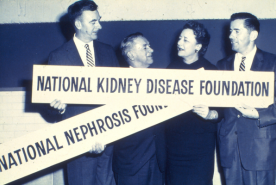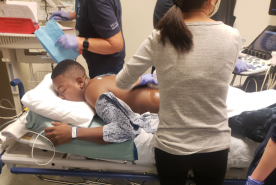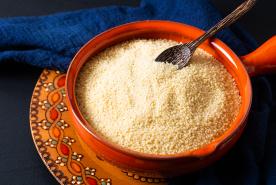May 19, 2022
Nearly half of adults in the United States (47%, or 116 million) have high blood pressure, increasing their risk of severe medical conditions like kidney disease, heart disease, eye damage, and stroke. Despite these risks, only about 1 out of every 4 people with high blood pressure have their condition under control. This may sound scary, but NKF is here to help you start taking control of your blood pressure today.
What is blood pressure?
Think back to the last time you were in the doctor's office. While getting your temperature, weight, and height taken, you also had your blood pressure measured. You may recall the blood pressure cuff that squeezes your arm tightly. The force gives the instruments the ability to gauge your blood pressure, measuring the top (systolic pressure) and bottom (diastolic pressure) numbers.
Systolic pressure: The pressure in the blood vessels during heartbeats.
Diastolic pressure: The pressure in the blood vessels between beats.
| Systolic pressure | Diastolic pressure | |
| Normal blood pressure | Less than 120 | Less than 80 |
| Elevated blood pressure | Between 120 and 129 | Less than 80 |
| High blood pressure | 130 or higher | 80 or higher |
High blood pressure occurs when the force of the blood pumping against the artery walls is hard enough to cause damage. According to the National Institute of Aging, blood pressure below 120/80 is normal in adults 18 or over, while 130/80 is considered high.
Understanding high blood pressure
High blood pressure is the second leading cause of kidney disease and causes the heart to work harder to get blood to your organs. Over time, this weakens the heart and may cause damage to the tiny blood vessels in the kidneys.
Severe high blood pressure can harm kidney function over a relatively short period, while mild forms can damage kidneys over several years.
If you have high blood pressure, your doctor may prescribe special medicine to help control it. They may also recommend a few or all of the following lifestyle changes.
Learn more about high blood pressure and kidney disease.
Six lifestyle changes to help improve your blood pressure
1. Know your numbers
Many people with high blood pressure don't have any symptoms. The only way to know if you have high blood pressure is to check it regularly at your routine check-ups.
2. Stop smoking
Smoking puts people at a higher risk of cancers, stroke, early menopause, and high blood pressure. It also slows the blood flow to vital organs, like the kidney, and can interfere with high blood medication. Quitting smoking can be very difficult, but it is doable. Visit smokefree.gov for helpful tools, tips, and resources.
3. Make physical fitness a priority
Regular activity helps you maintain a healthy weight, control cholesterol, build strength, and sleep better. Aerobic exercises like dancing, walking, swimming, and cycling are great for healthily increasing your heart rate and strengthening large muscle groups.
4. Choose a heart-healthy diet
The DASH diet is a recognized treatment for hypertension, heart disease, and kidney disease. This diet is chock full of fruits and vegetables, fiber, potassium, calcium, and magnesium. It encourages people to limit salt and fat consumption and swap full-fat dairy products with 1% skim or nonfat. Learn more about the DASH diet.
Always speak with your healthcare provider before making any changes to your diet, as you may have special considerations not listed here. Find a kidney dietitian near you.
5. Know your family history
A family history of high blood pressure increases your risk. Knowledge is power, so if this is in your family history, start taking action to manage your blood pressure now.
6. Manage stress
When stressed, the body automatically reacts to get you out of danger and into a safe space. Heart rate and breathing increase while fats and sugars are released into the bloodstream to give muscles energy to escape danger.
When stress occurs frequently, these reactions actually damage the body and may cause high blood pressure. If you struggle to manage your stress levels, speak with your healthcare provider. You can also try:
- Eating healthier foods
- Limiting salt and caffeine (especially if you have high blood pressure), sugar (especially if you have diabetes), and fats.
- Setting aside time to relax.
- Talking to a friend, loved one, or spiritual leader
- Journaling and setting realistic goals or expectations
- Getting enough sleep
- Regularly exercising

















